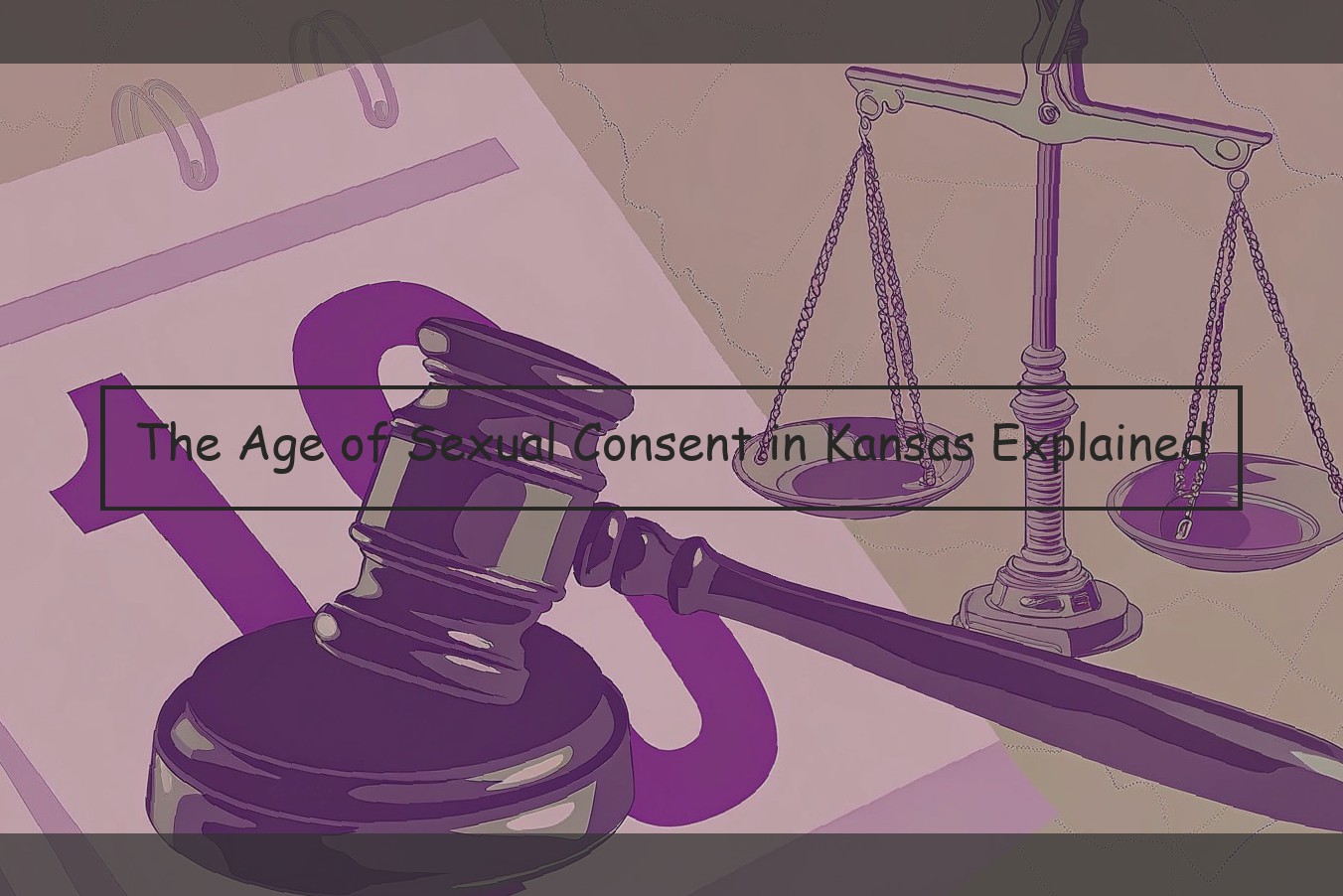
Kansas’s Legal Age of Consent
Kansas, like each state, establishes by statute the age at which a person can consent to sexual conduct. This is known as the age of consent. It is 16 years old in Kansas. In other words, if a person has sex with someone who is under 16, then that person may be prosecuted for a sex crime such as rape or aggravated assault. This applies even if the younger person gave apparent consent.
That being said, it is important to note the difference between state law and federal law. Federal law establishes a statutory line for sex that is seven years older than the state law line . In Kansas, persons who are 21 or older cannot have sex with persons who are 16 to 18. The penalty for violating this law is a Class C misdemeanor. These laws are somewhat inconsistent, and that inconsistency creates certain confusion.
Regarding exceptions to the law, there are none related to the age difference. There is a close-in-age exception that states that 16-year-old persons above the age of three years can consent. In other words, someone who is 19 years old and their 16-year-old girlfriend could have sex without one of them being subjected to solicitation charges.
Statutory Rape Laws in the State of Kansas
Under Kansas law, a person cannot have sexual contact with or engage in sexual intercourse with a person under 16 years of age. The only exceptions to this prohibition are if the victim is less than 14 years of age and the perpetrator is not more than 2 years old; if the victim is at least 14 years old, further, sexual contact with a person less than 18 years of age and who is either: 1) a public servant; 2) a member of the PTB board; 3) coach; 4) employed or volunteer without pay in an official capacity for a school (other than a part-time school employee) or a school sponsored activity or program; 5) volunteer parent assisting in a school (other than a part-time school employee); or 6) psychiatric hospital personnel and is subject to Kansas’ law on abuse of incapacitated adults and elderly persons, such conduct will be considered aggravated criminal sodomy. Conversely, it is a class A person felony if a person engages in consensual sexual intercourse with an unmarried person who is between 14 years and 16 years old under the age of 14 if they accomplished the act by force, threat of harm, or by someone aiding the actor in overcoming the will of the victim. The prohibition of sexual relations between a person and someone under the age of 18 is based on the momentary lapses of judgment that can occur during adolescence, which can expose vulnerable minors to irreparable harm.
Age Differences
When considering the age of consent in any state, it is important to keep in mind that the age difference between a couple matters a great deal. "Romeo and Juliet" laws exist in many states to protect young people who have been charged with statutory rape. Young people in such situations are often of ages 16 to 19 and have approximately a three-year age difference. A 2013 law ensures that underage teens in Kansas who have consensual sex are not charged with statutory rape. The law considers spouses, fiancés and boyfriends or girlfriends of the same or similar ages to be among those who can provide legal consent. The law also established a potential three-month variance for young people in the case of pregnancy.
Legal Consequences and Penalties
The legal consequences for sexual activity with a minor are severe in Kansas. Consent is irrelevant when a minor is involved. If found to have violated consent laws, the accused will face a felony charge that could result in substantial prison time. Even in cases where the alleged perpetrator is a high school student, the law does not make exceptions for parties of similar ages.
In many circumstances, the accused will be charged with aggravated criminal sodomy. This is a level 1, person felony that carries a punishment of 13 years to life in prison. Because minors are considered children in the eyes of the law, it is a crime to engage in sexual activity with anyone under 16. There are few exceptions to this law, and in any case, the law will always heavily favor the prosecution in Kansas. Those charges are treated the same whether the minor is the perpetrator or the victim.
Under Kansas law, sex crimes are often considered "crimes against persons." This is generally the case in sex crimes against minors. The law is merciless on those who are alleged to have "used" teenagers for sexual gratification. This is fundamentally because the law believes that children are too young to give informed consent. This lack of understanding of one’s own power, if you will, is believed to justify any sexual act with a minor as a crime against the victim.
As an example, a senior in high school who has consensual sexual intercourse with a sophomore, who is 15 years old, will be charged with aggravated criminal sodomy if the victim is under 16. The senior will be automatically charged as an adult, regardless of whether or not they are still a minor themselves.
The Influence of Parental Permission or Marriage
Parental Consent and Marriage: Conditions of Kansas Statute K.S.A. 21-5505
Although activities involving minors without parental consent can result in severe criminal penalties, there are certain circumstances under which the statutory age of consent no longer applies. Under K.S.A. 21-5505(f), neither public indecency nor sexual battery will be charged when the parties are both minors, and parental consent has been obtained. Kansas Statute K.S.A. 21-5502(b)(2) defines a minor as follows: (1) Less than 14 years of age; (2) less than 16 years of age and more than four years younger than the offender; or (3) less than 18 years of age and more than 10 years younger than the offender. Parental consent must be obtained prior to engaging in conduct prohibited by K.S.A. 21-5502 and, if engaged in nonetheless, the individual may present proof of parental consent as an affirmative defense to any such charges. When parents consent for sexual activity with a minor, the consent does not create a legal marriage or authorize parental consent for any type of sexual conduct. Consent is merely an exception to a minor’s lack of capacity to consent. Under K.S.A. 21-5502(f) , even if parental consent is obtained, the parties still may open themselves up to charges of aggravated indecent solicitation of a child if they are not legally married. As mentioned earlier, this is a crime defined in K.S.A. 21-5510 A…(a)ny person who solicits, either orally or otherwise, a minor for immoral purposes, shall be guilty of a class A nonperson misdemeanor if such person is less than 18 years of age. (b) Any person who solicits, either orally or otherwise, a minor for immoral purposes, shall be guilty of a severity level 7 person felony if such person is 18 years of age or older. In light of this statute, the marriage exception provided in K.S.A. 21-5505(f) is important. K.S.A. 21-5505(b) defines a "spouse," when the parties are of the same or opposite sex, as a person who is legally married with the other person by a marriage register or common law marriage. As such, the relationship between a minor and another person that is sufficient to supersede the legal age of consent must be a marriage that was legally entered into either under a K.S.A. 23-1102 marriage certificate or under a common law marriage.
Comparison with Other States
The age of consent laws vary by state, but the most common minimum is 16 and that’s the case in Arkansas, Kentucky, Louisiana, West Virginia and the District of Columbia. They are common at 17 in Hawaii, Ohio, Idaho, South Carolina, Utah, Delaware, New Hampshire, New Mexico and Oregon. Those that are 18 in Alabama, Mississippi, Arizona, Florida, California and South Dakota. Texas is unique because of the vast number of exemptions to having sex with a minor that would be otherwise illegal. That means those over the age of 17 can be 16 without breaking the law.
Of the national averages, Kansas is much lower as at 14, only Illinois (13) and California (15) have lower ages of consent. What ultimately matters to judges and juries is that every state has their own laws, there is no uniformity, and there are always a myriad of exceptions to the rules.
Recent Developments and Public Discussion
The age of consent in the state of Kansas has been a hot button topic in courtrooms and in public debate for years. The controversial topic of child predators, sexual exploitation, and statutory rape have long been present realities, both in Kansas and throughout the country. Public attitudes toward sex offenders, the consequences of sexual abuse, and laws regarding the proper punishment of these offenders have shifted significantly over time.
The state of Kansas has taken some steps to address this issue, refining laws to keep up with shifting societal views. In 2008, Kansas amended its laws to provide for indefinite sentences for certain sex offenders; the law allowed for longer probation periods, house arrest, and the electronic monitoring of offenders. The law also added a unique stipulation: those who went through the legal system and were deemed sexual predators could have their number of required years in reporting and treatment reduced if they completed a special program.
These changes overcame serious legal challenges brought in the wake of a particular child sex abuse case in Kansas that went all the way to the Supreme Court in 2009. The 2009 case (Knowles v. Kansas) pitted the state of Kansas against Ernest Knowles, who was found guilty of a heinous sex crime. He was sentenced for a minimum of 50 years in prison, and he was not eligible for parole. However, during his incarceration, the Kansas legislature amended state law so that Knowles was eventually eligible for an earlier release.
Not long after his sentence was handed down , Ernest Knowles was submitted to a series of psychological tests. The psychiatrist who treated him felt, based on his treatment and testing, that Knowles’ chances of re-offending were very low. But this new information went counter to a state law that had been amended since his sentencing, which made him eligible for early release.
Knowles’ attorneys argued that the amendment was unconstitutional; they made the case to the Supreme Court that it was a violation of his Due Process rights. The Supreme Court of Kansas agreed and overturned the amended law. The Kansas Supreme Court stated that the Kansas Legislature could not use the amended law to change the rules of an existing conviction. Had Knowles been eligible for early release at the time of his conviction, it may have altered his sentencing.
This case, which pitted the state of Kansas against the Office of the Attorney General and the Secretary of Corrections, received both national and local media attention. It was the topic of several newspaper articles in the Topeka Capital Journal, and other online news outlets. This landmark case and the accompanying publicity were a major factor in the 2011 revision of the Kansas Constitution, which prohibited the government from reducing the time offenders spend in prison. The case also led to legislative efforts to require more DNA testing, change sentencing guidelines, and increase penalties for sex offenders.


